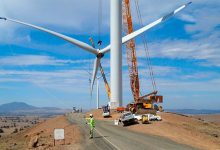Bank Australia says it has delivered on its promise to become Australia’s first bank to source 100 per cent of its electricity from renewable energy, signing up for an off-take agreement with Pacific Hydro and installing rooftop solar on its buildings.
“Being the first bank in Australia to switch to 100% renewable electricity is a huge achievement for us. Our customers have told us they want to see clear action on climate change, and we’re pleased to show how business can lead on climate,” managing director Damien Walsh in a statement.
Bank Australia announced its intention to purchase 100% of its electricity from renewable sources in April and at the time called on other Australian businesses to follow their lead in joining the RE100 initiative, an international partnership between the Climate Group and the CDP, that encourages businesses to switch to purchasing their energy from 100% renewable energy sources.
Bank Australia says has entered into a 10-year power purchase agreement with renewable energy project developer Pacific Hydro in a deal facilitated by the Melbourne Renewable Energy Project Group.
Bank Australia will also install rooftop solar on the bank’s office locations, including its Melbourne headquarters and its National Contact Centre located in the Latrobe Valley.
The PPA will acquire power produced by Pacific Hydro’s Crowlands wind farm in Western Victoria, which commenced construction in March last year and generated electricity for the first time in early 2019.
The 80MW Crowlands Wind Farm is located 205kms from Melbourne, with the partnership of 14 companies committing to purchase 88GWh of electricity from the wind farm each year, enough to power 17,000 homes.
The Melbourne Renewable Energy Project facilitated the ‘bulk purchase’ of renewable energy from a collection of corporate customers, lead by the City of Melbourne.
In addition to Bank Australia, other partners include the University of Melbourne, RMIT, Federation Square, City of Port Phillip, City of Yarra, Moreland City Council, Zoos Victoria, Citywide, National Australia Bank, Australia Post, Melbourne Convention and Exhibition Centre and NEXTDC.
Bank Australia reaches the 100% renewable energy milestone ahead of big-four bank Westpac, which also announced in April that it had committed to purchasing 100% renewable energy by 2025.
Head of RE100, Sam Kimmins congratulated Bank Australia on successfully turning their pledge to purchase renewable energy into a reality through the Melbourne Renewable Energy Project Group.
“Congratulations to Bank Australia on reaching its RE100 goal so quickly – this is a leading financial institution seizing the big investment opportunities of the future,” he said.
“Partnering with others to buy wind power at an affordable price is a model used by leading businesses around the world. With benefits ranging from lower risk to increased global competitiveness, we expect many more Australian companies to get going on the path to 100% renewable power.”
Australian coordinator for RE100 Jon Dee, praised Bank Australia as setting a positive example for other businesses looking to both reduce their environmental impact and use innovative ways to reduce the cost of energy for their businesses.
“As the first Australian member of RE100 to achieve a switch to 100% renewable electricity, Bank Australia has set a really positive example. They’ve increased the use of wind and solar power and at the same time they’ll save money on their energy bills. They’re showing other Australian companies that renewables are beneficial for the bottom line as well as the environment.” Dee said.
RE100 estimates that companies can save 15% to 47% of the wholesale energy costs through a well negotiated power purchase agreement with renewable energy projects.
A total of 174 major companies have joined RE100 and committed to purchasing 100% of their electricity from renewable sources, including 76 companies with operations located in Australia. These include food manufacturer Mars and Carlton United Breweries.
Bank Australia had previously achieved carbon neutral status as a bank, as well as establishing the Bank Australia Conservation Reserve, a 927 hectare reserve for the conservation and protection of native habitat, on behalf of the Bank’s customers.







